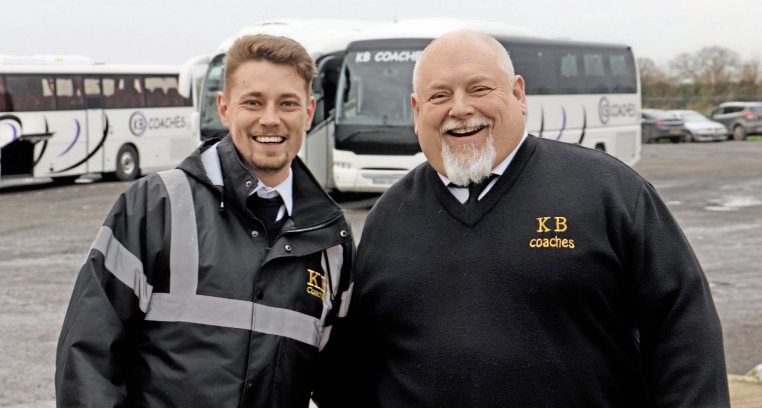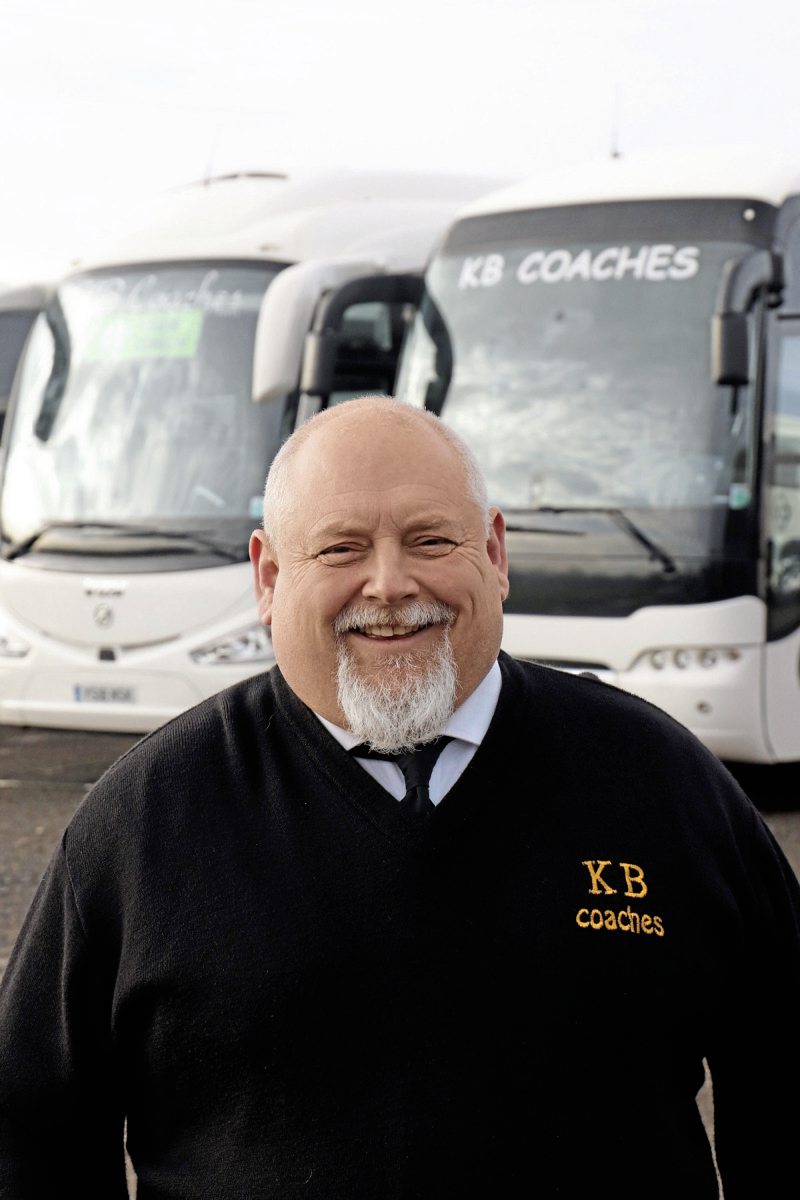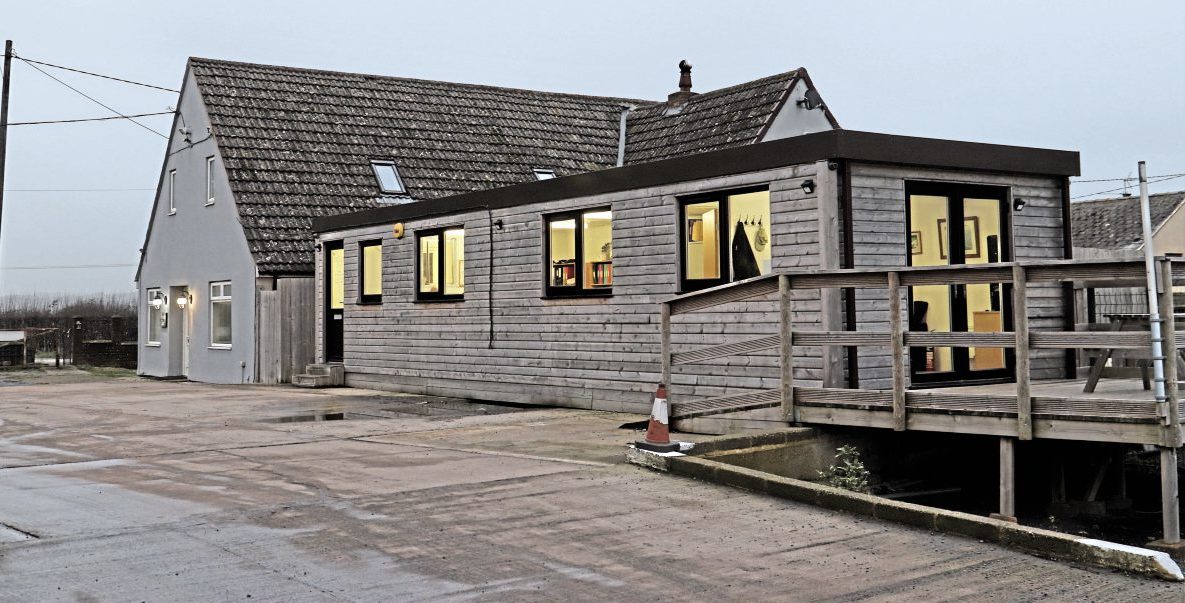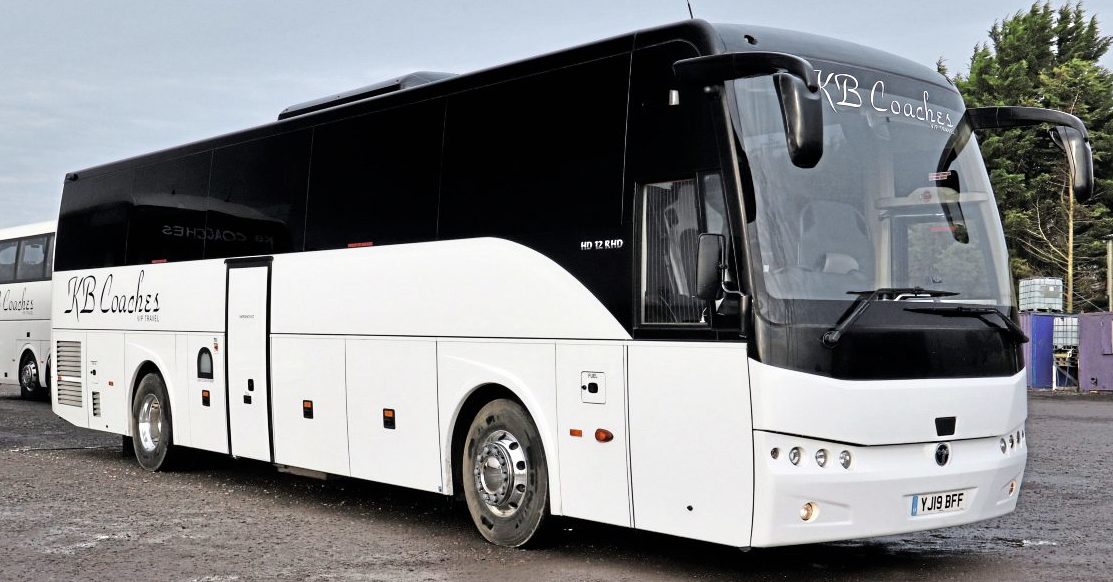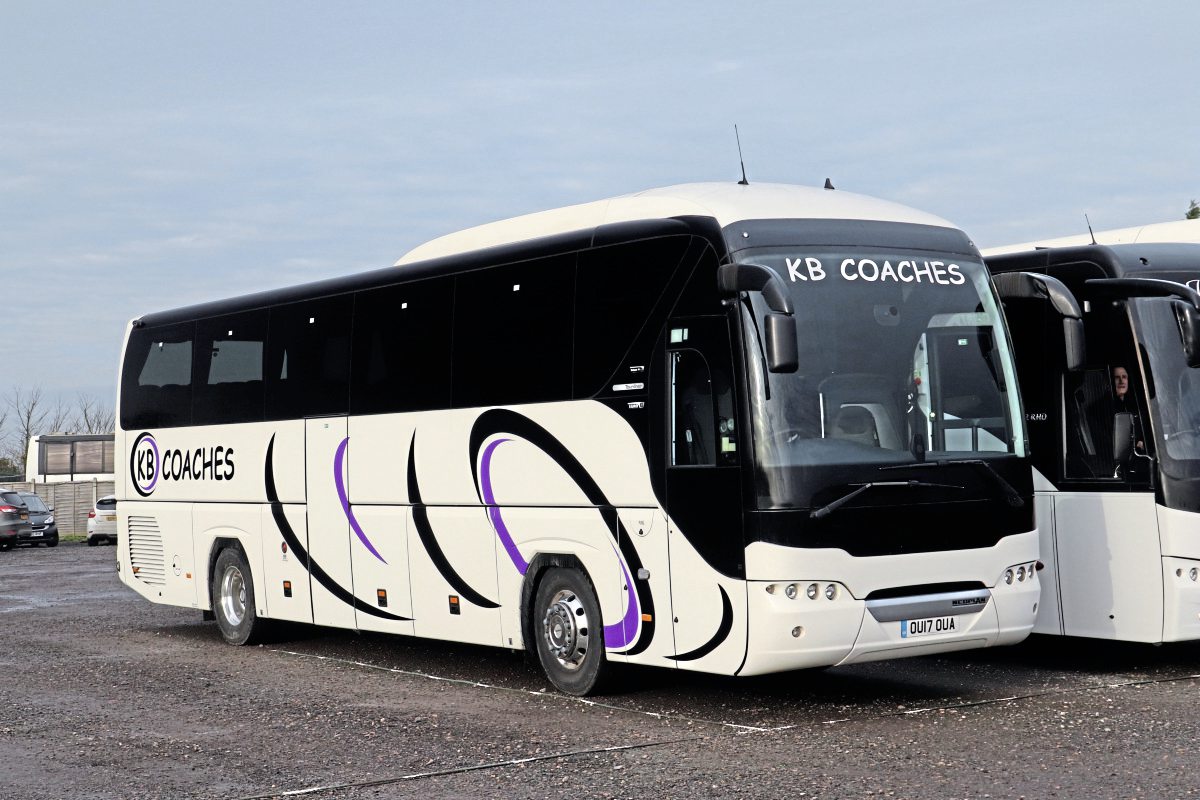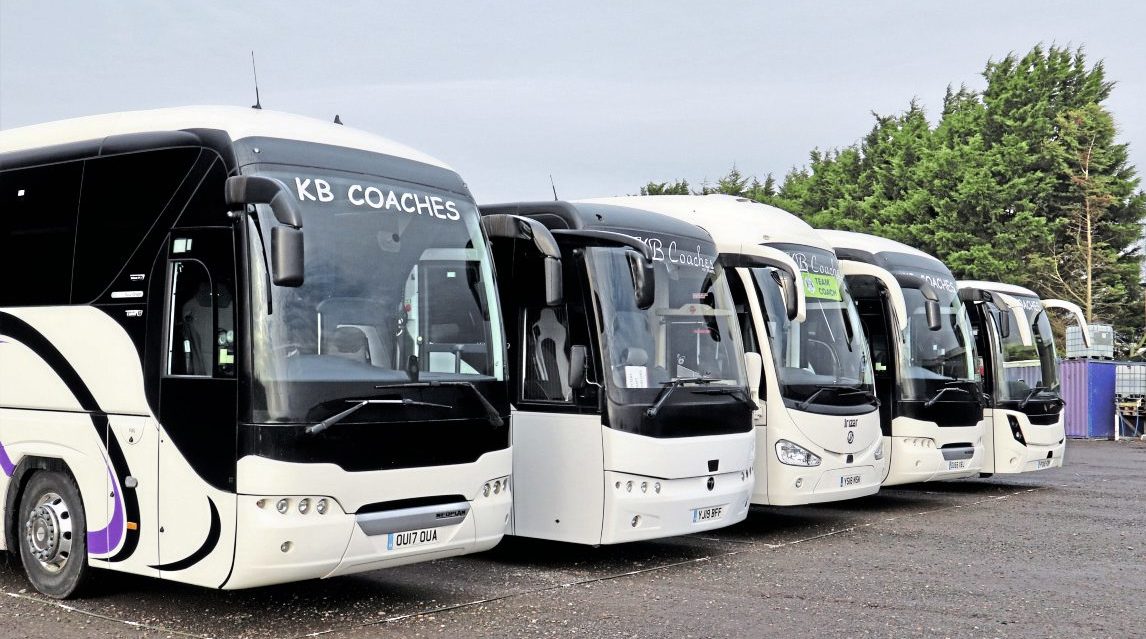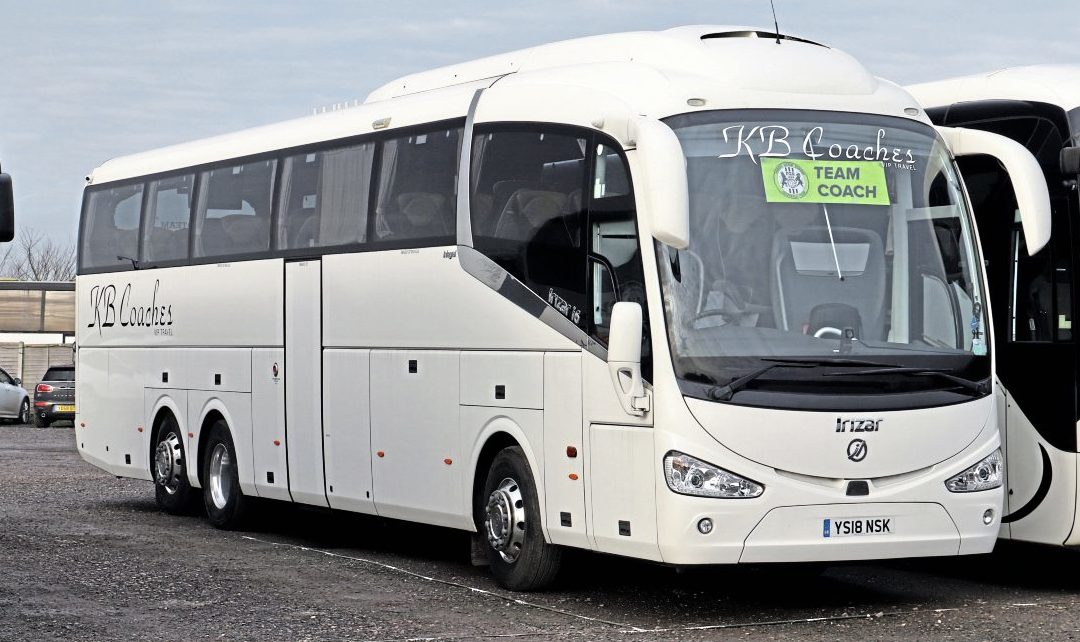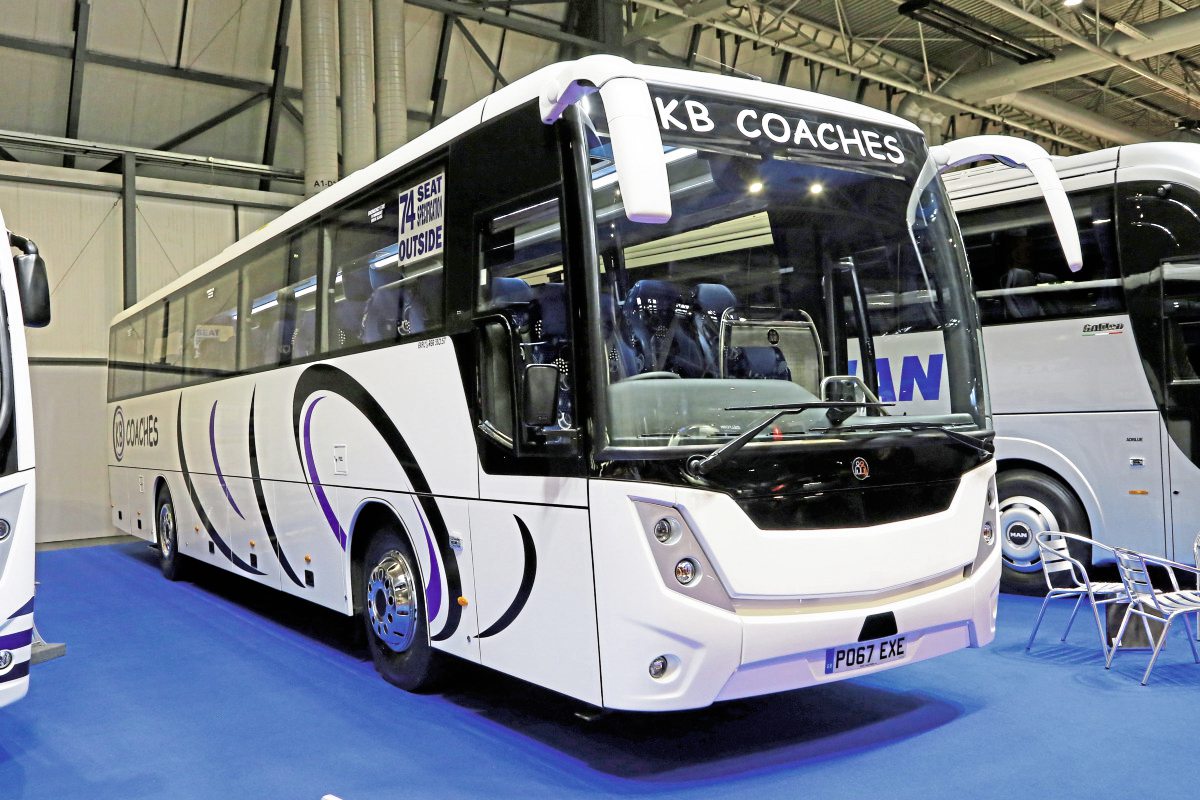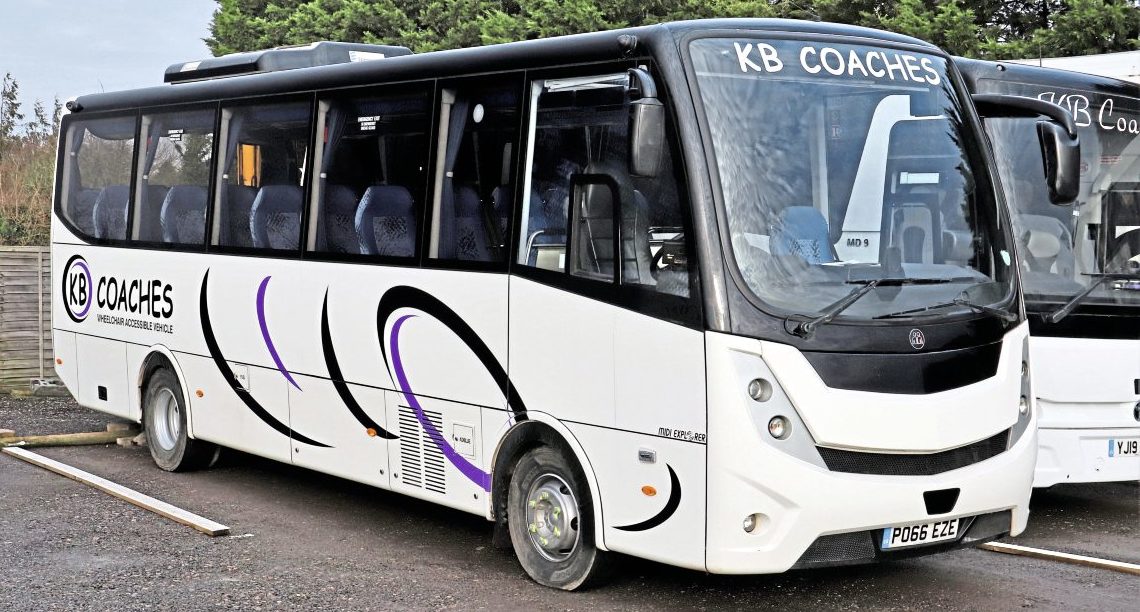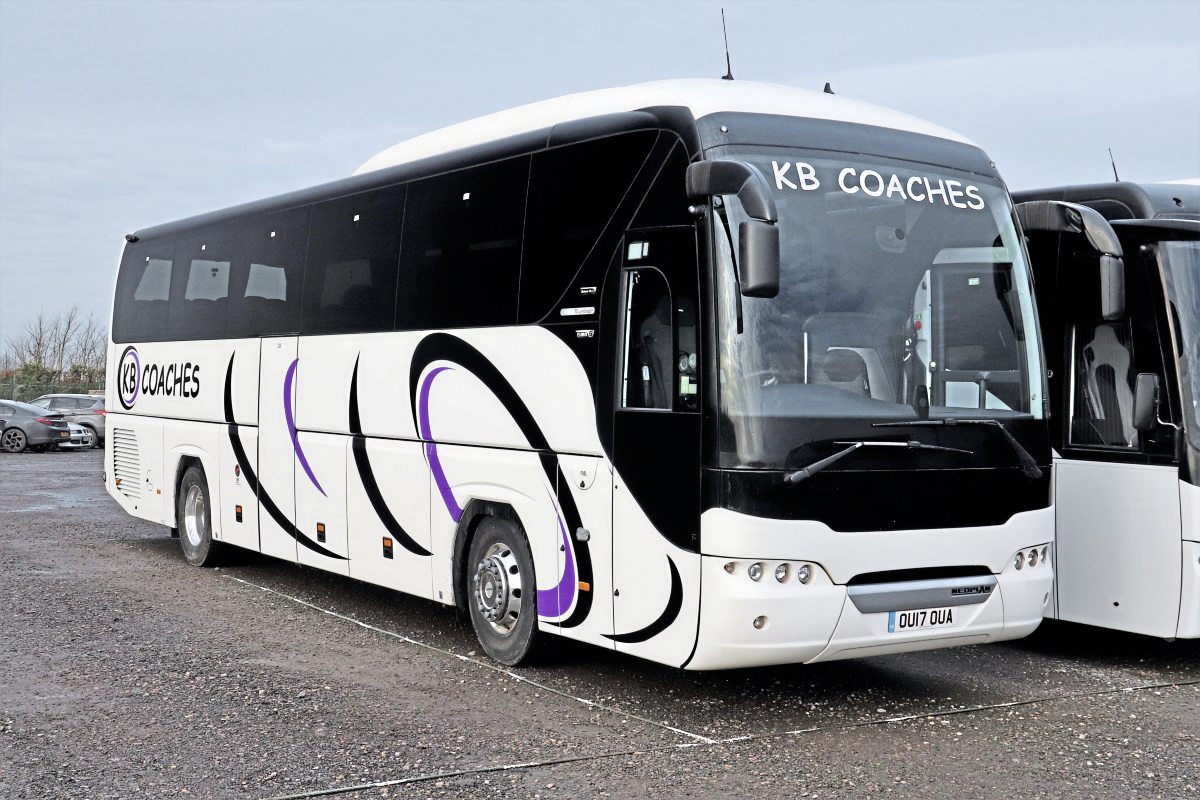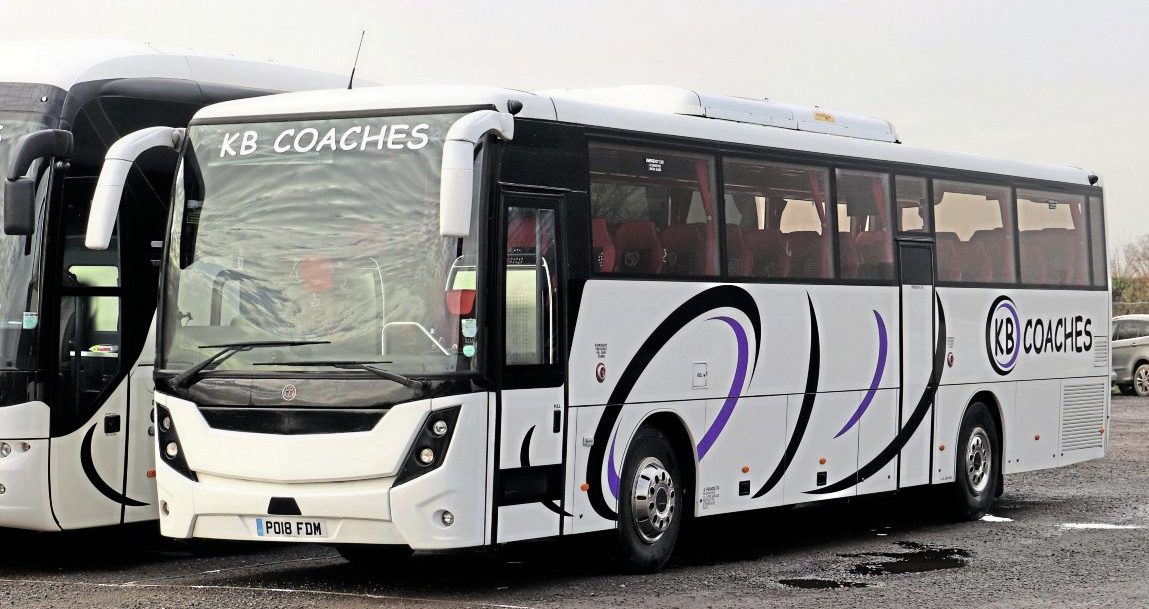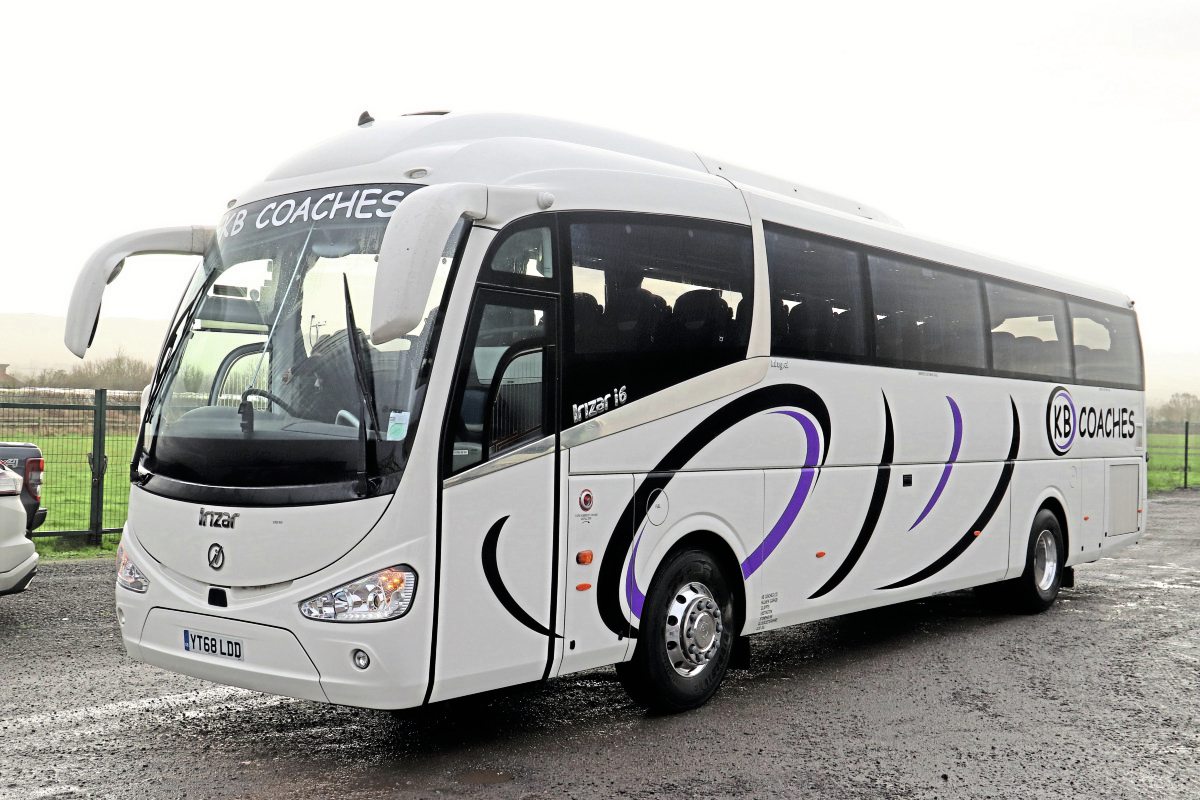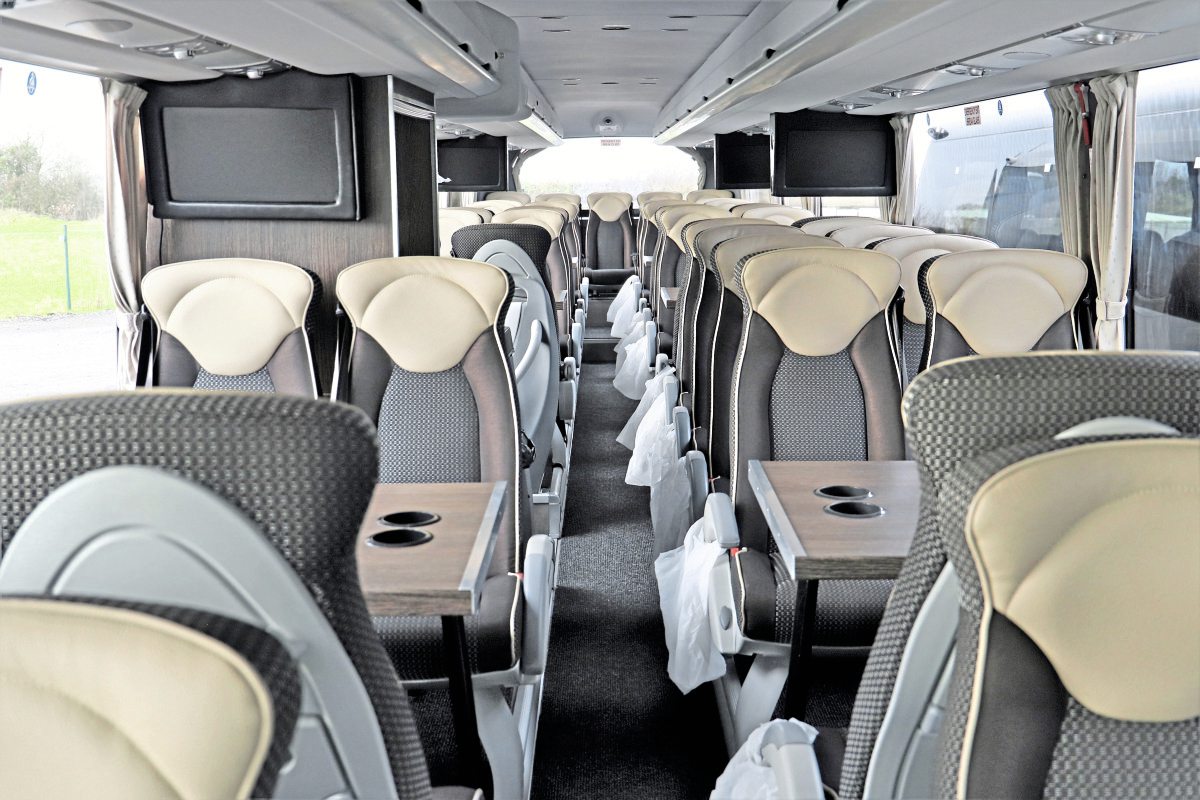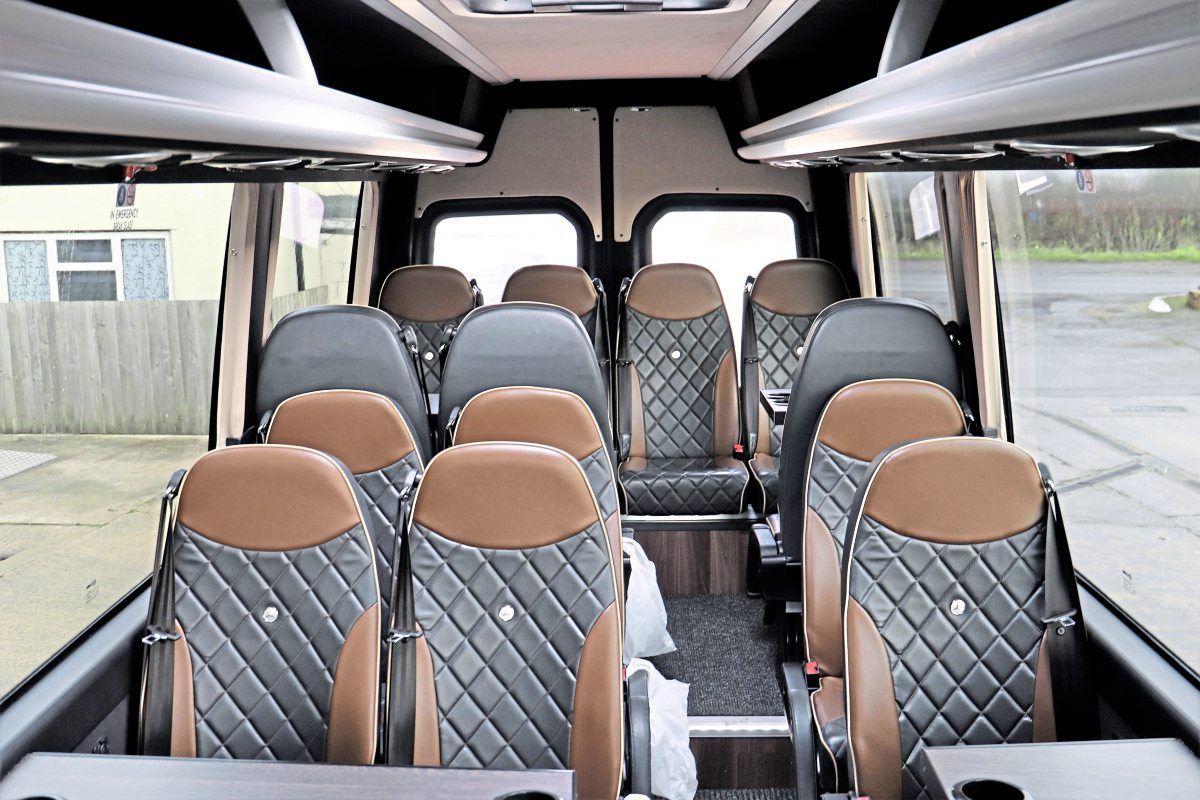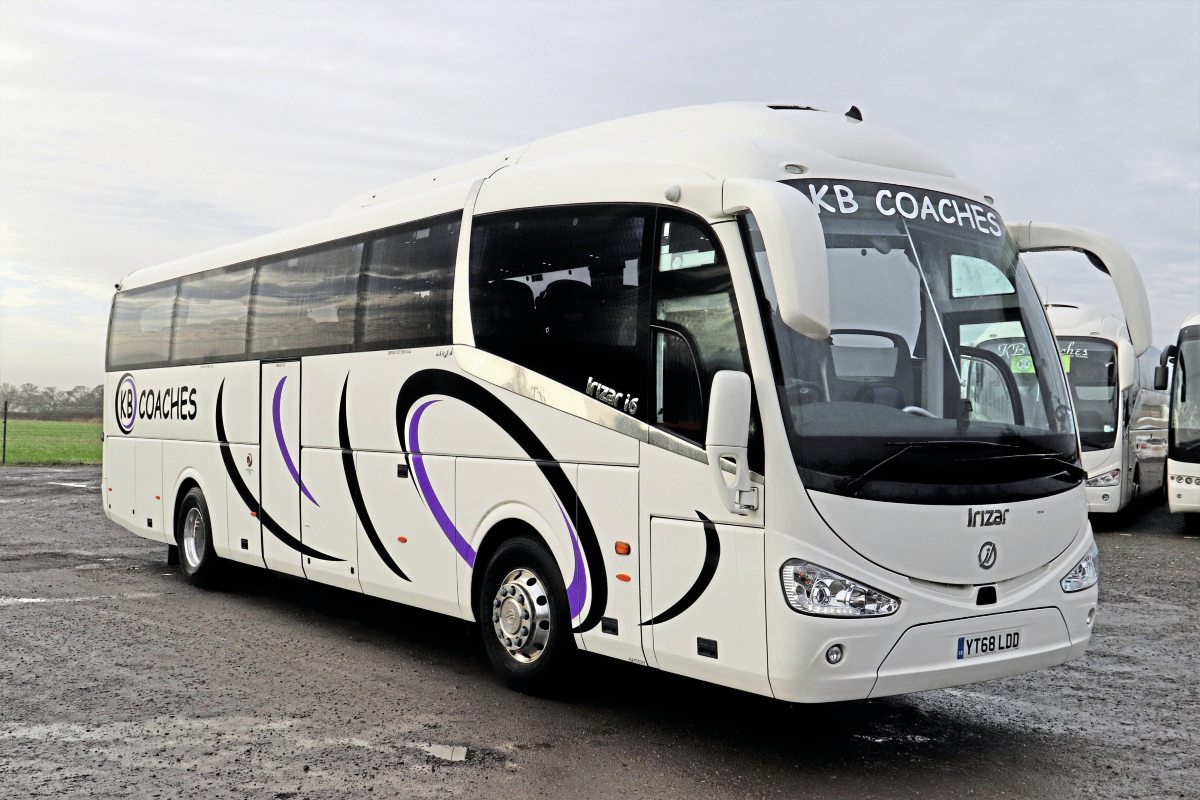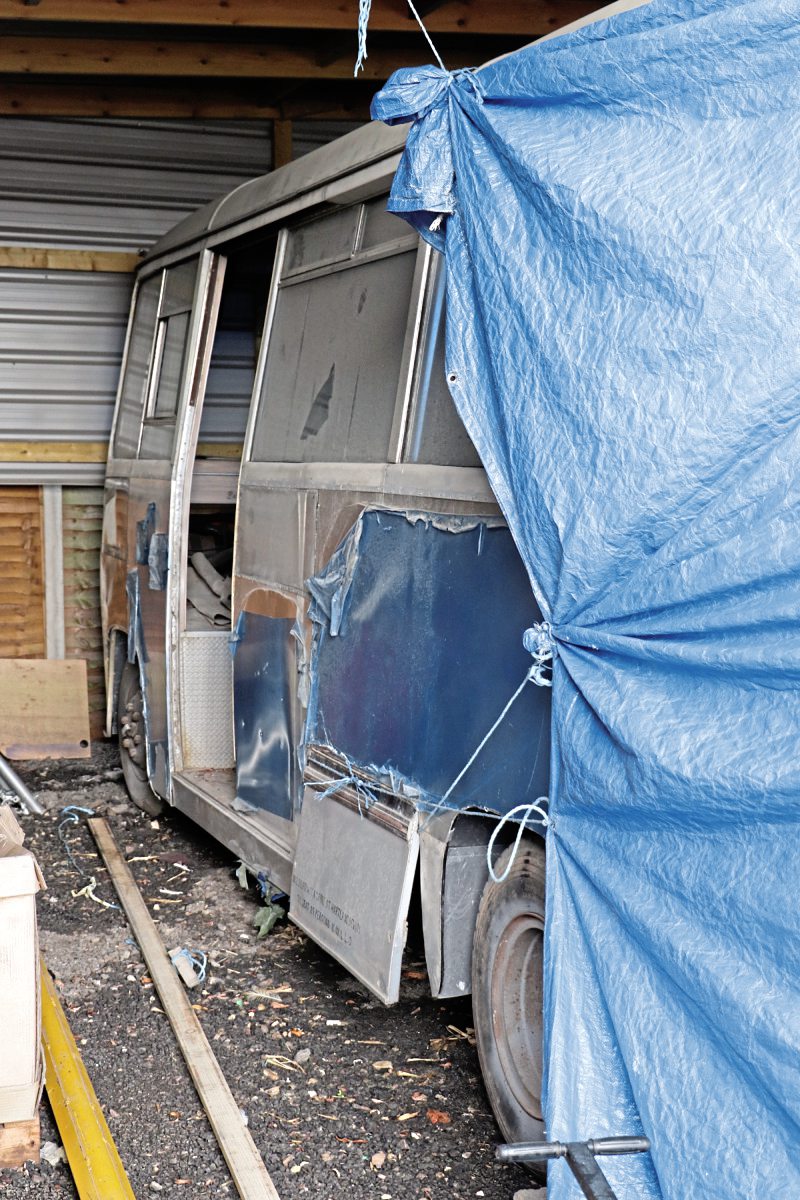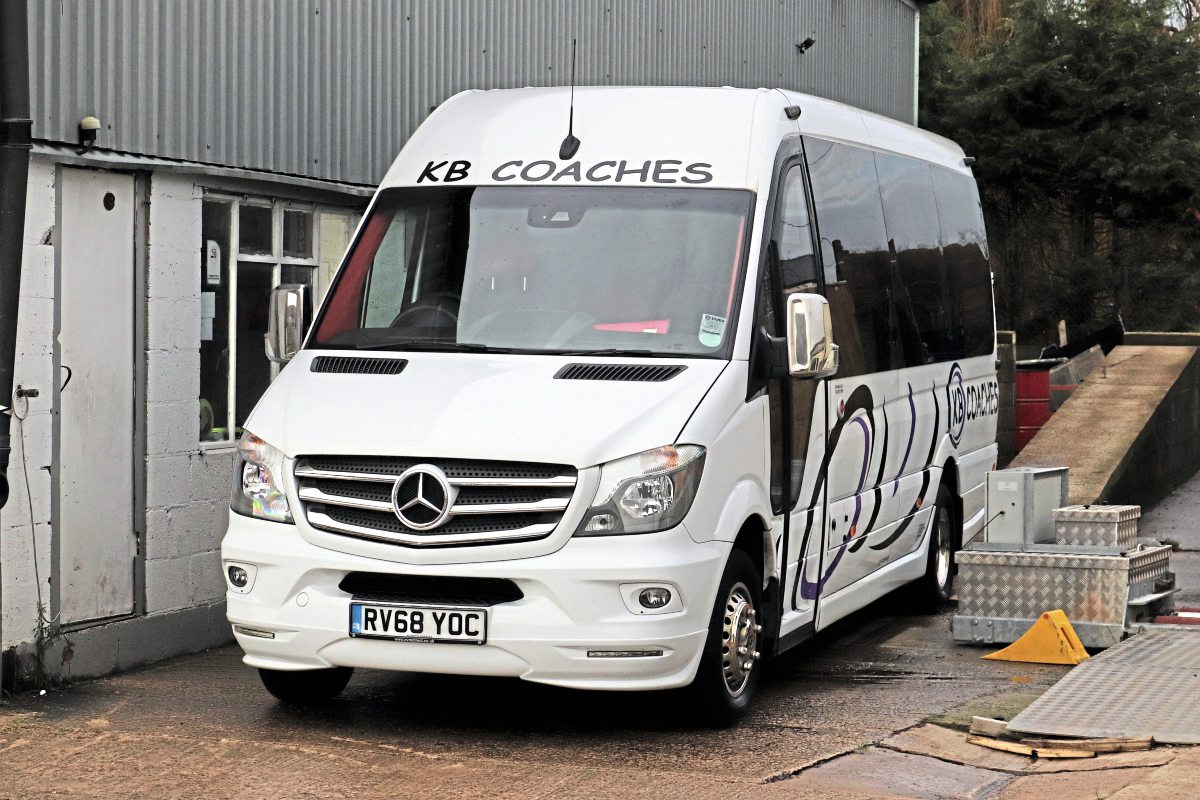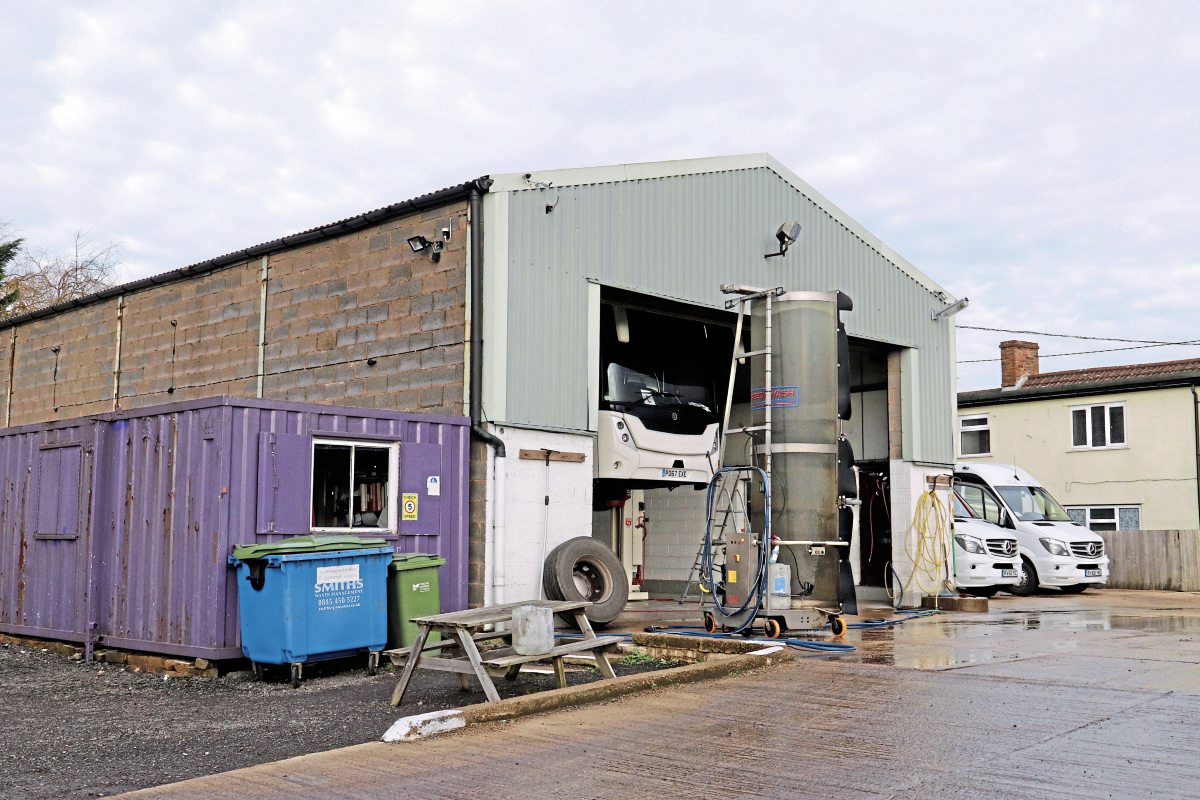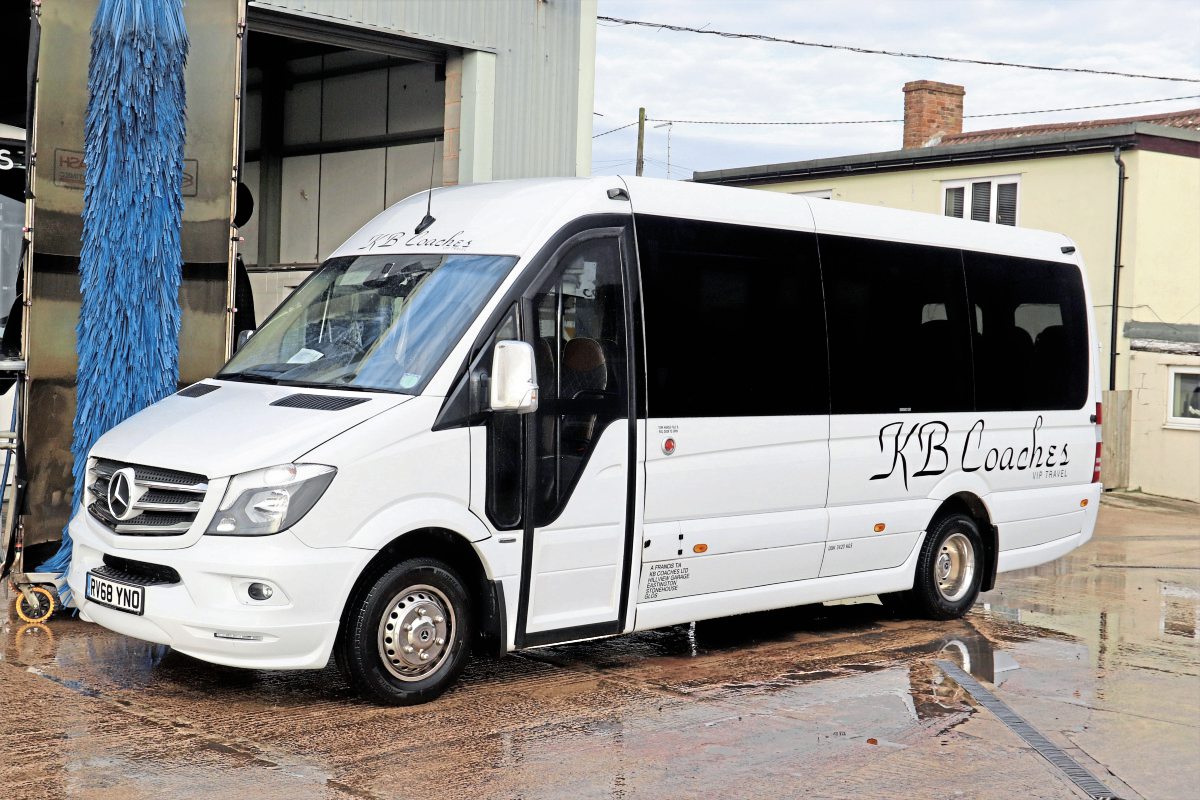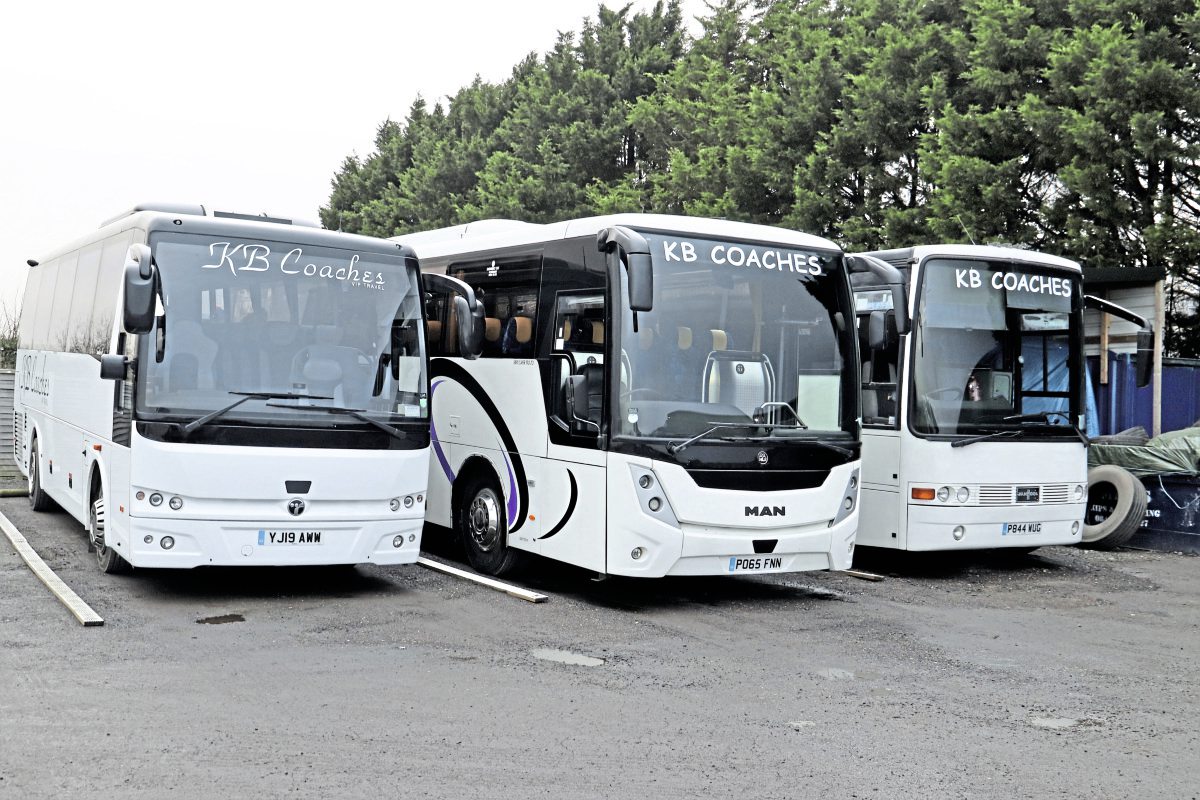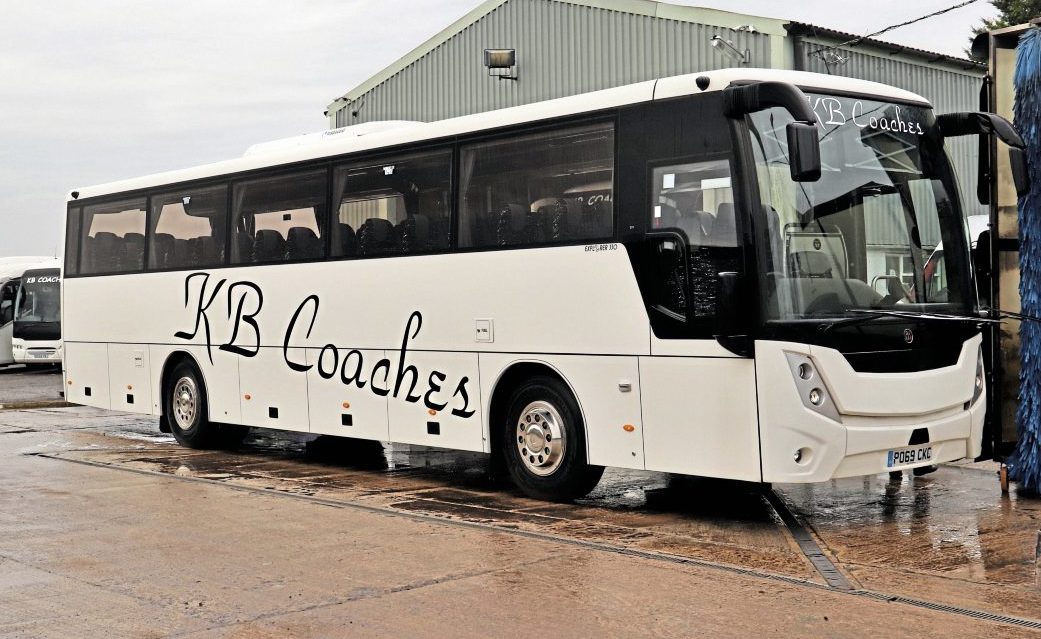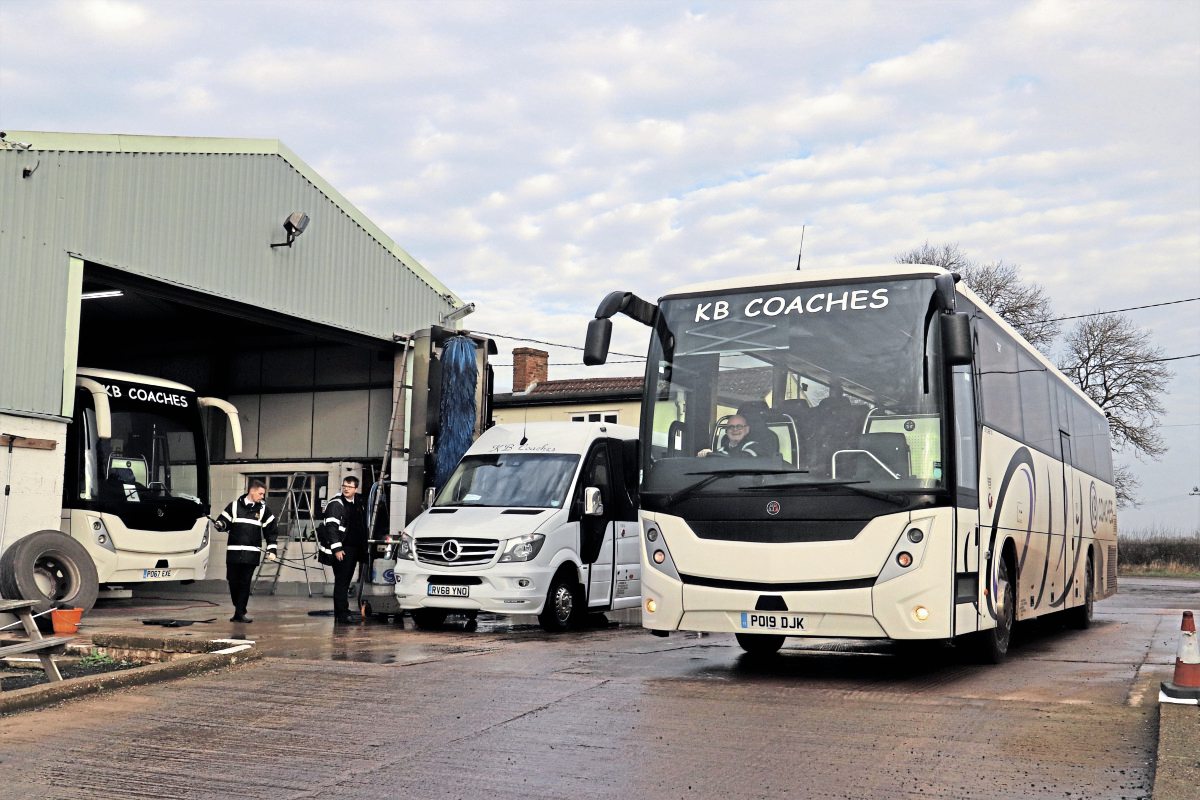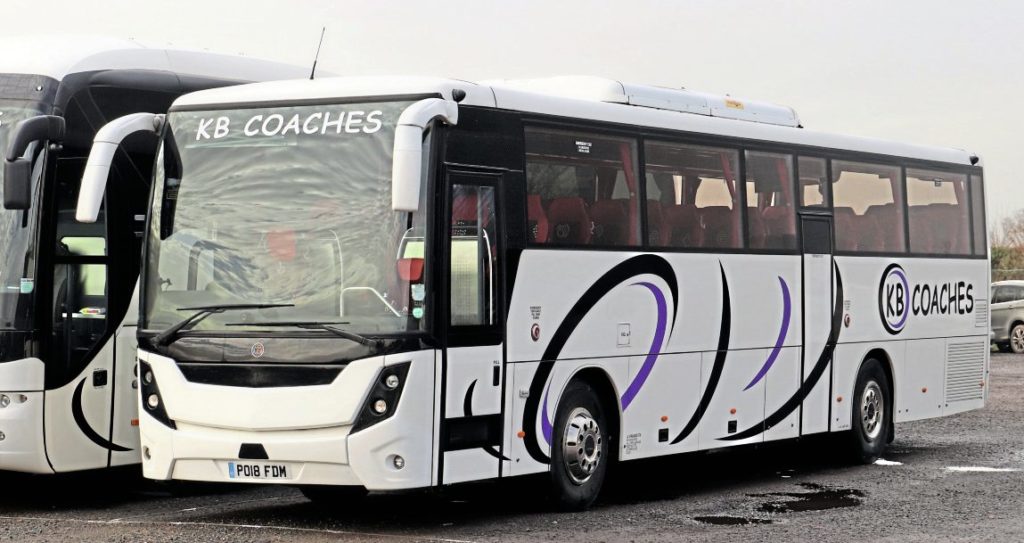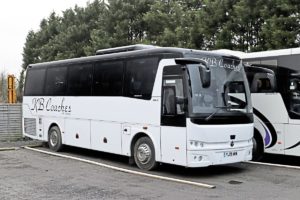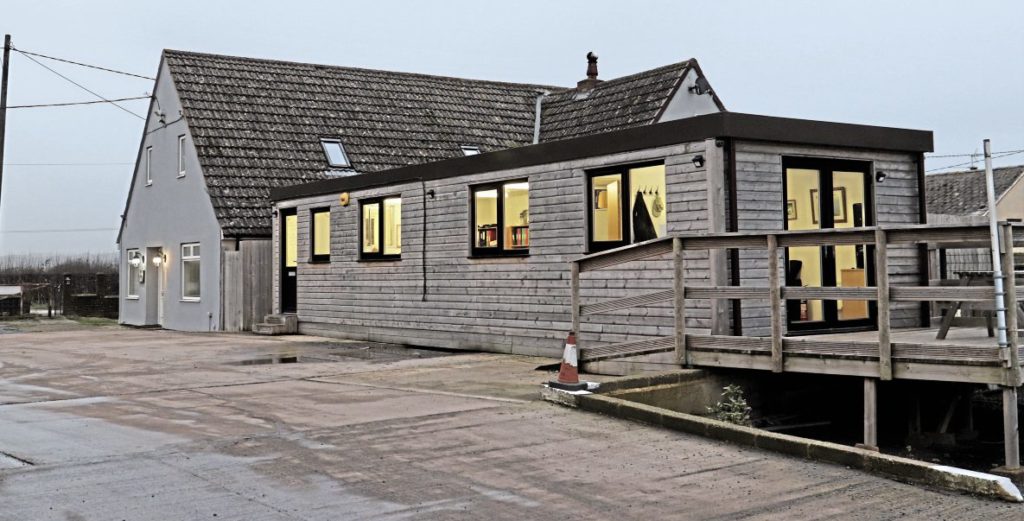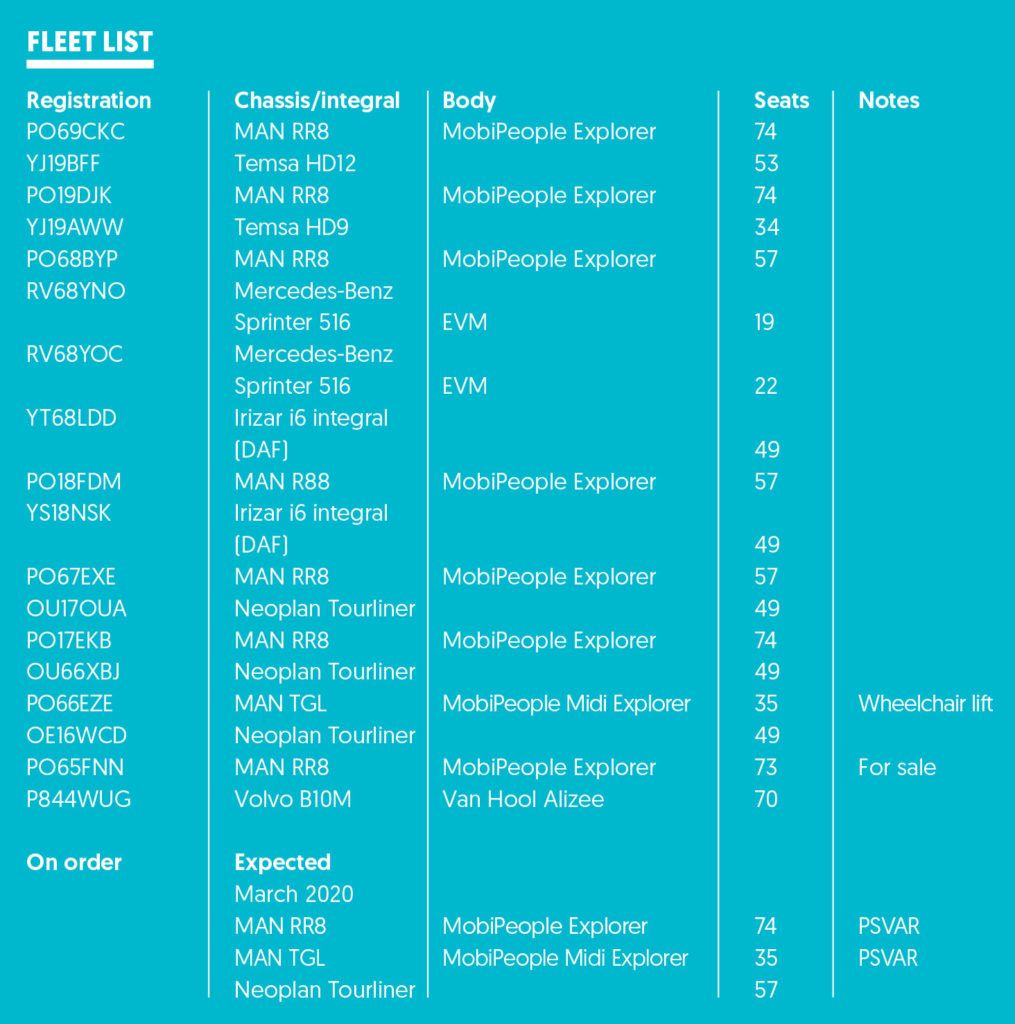KB Coaches – no worries
A combination of hard work, relentless attention to quality, careful buying, reinvestment in the company, embracing the new and focusing on profitability has seen Gloucestershire-based KB Coaches transformed from a failing operator to a thriving concern. Bus and Coach Buyer heard all about it from Andy Francis who just seems to take everything in his stride.
KB Coaches started around 40 years ago, when Ken Boulton and Ben Niblet contributed the first letters of their forenames to its title… though Ben didn’t remain with the business for very long.
The rented site at Claypits near Stonehouse had even earlier coaching connections as the base for Lock’s Coaches. Andy used to travel on a KB coach to school and later gained experience as a PSV and commercial mechanic before working for Ebley Coaches running their workshop. In 2000, with KB Coaches before the Traffic Commissioner for maintenance issues, Andy, then aged 31, joined a partnership with Ken, taking responsibility for the maintenance of a seven-coach fleet that included three Van Hool Volvos, a couple of Fords, a Duple 425 and a Mercedes-Benz minibus.
At that time, Andy did not have his operator’s CPC qualification so he bought a home study pack and got one. It was a question of doing whatever work could be found to earn some money and it saw the fleet extensively involved in rail replacement in the days when Fraser Eagle held the contract; fortunately their demise left the business only around £1,500 out of pocket.Once money was coming in, the fleet was upgraded with former Shearings B10M Van Hool Alizees as well as a DAF Alizee, although the gearchange on this was not as good. A sign of the improved position was the purchase in 2007 of the company’s first brand new coach, a Volvo B7R Sunsundegui Sideral that was sold only last year. A new Esker Riada followed soon after and in 2009 a King Long XMQ6127. Another new Sideral, this time a team coach on a B12M chassis, arrived in 2010 and in 2011 a new EVM Sprinter. The seven licences were increased to eight and, in 2011, up to ten.
The partnership lasted for 14 years before Andy bought Ken out in 2014, at which time the fleet had 14 licences and was running 12 coaches. Ken subsequently ran a couple of vehicles on his own for a while before retiring: “He’s 82 now and we still say hello,” said Andy.
In the mid-2000s an opportunity arose that was too good not to take advantage of. The yard had always been rented from the late Lionel Amos who had once run the Ladvale Coaches operation as well as Lock’s Coaches. Lionel called in one day to say that his business had gone into receivership, he was having to buy the premises back off the receivers and because of this the rent would be going up. Sensing an opportunity, Andy and Ken got in touch with the receivers as soon as they could, explained that they were sitting tenants and were able to purchase the site themselves.
Work profile
The highest profile work undertaken is three football contracts; Forest Green Rovers of League Two along with Gloucester City and Weston-Super-Mare, although other teams have also been carried in the past. A lot of custom comes from a local private college, most of it sports related but also some field trips. On top of this there are probably 40 to 50 swimming trips a week. The remainder of the workload is mainly school-based private hire as far south as Bristol (20 miles) and as far north as Tewkesbury (20 miles).
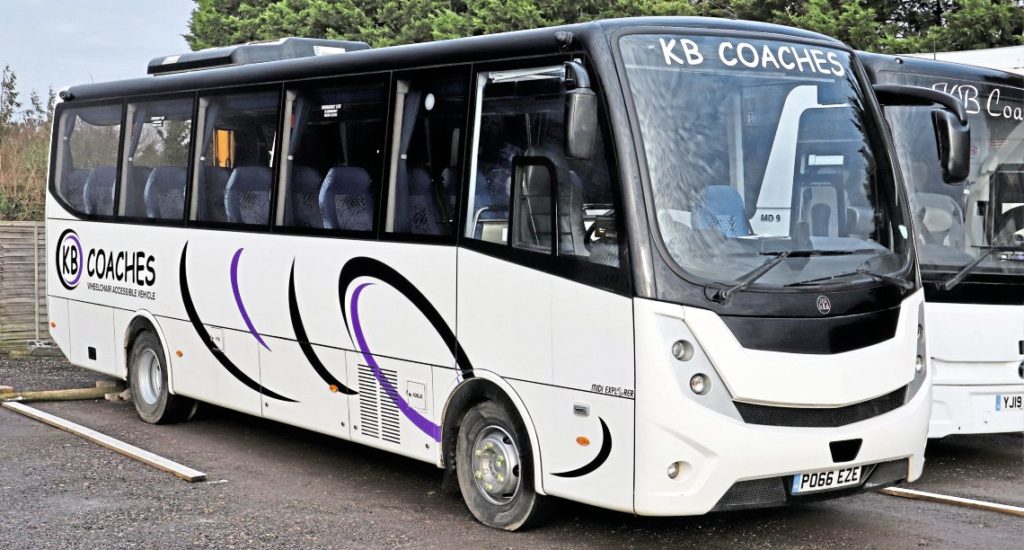
The company’s first wheelchair accessible acquisition was this MAN TGL with MobiPeople 35-seat body which arrived in 2016. A similar coach will be added to the fleet in March.
At one time the business ran its own tours and holidays which were organised by Brenda Lock, who lived next door and had been associated with the Lock’s Coaches operation. This aspect of operation is no longer undertaken because the clientele is no longer there. “They’re all jet-setters now,” he said, adding: “It was a lot of work for little profit. We’re by the motorway so everyone else picks up round here en-route. I can’t see us doing it again because there’s no money in it.”
There are a lot of areas of the market that Andy would prefer not to be involved with: “I don’t want to get into double deckers or service work,” he said. “It seems that every company that goes bust has been doing service work.
“We don’t do National Express either because, at the peak, we can’t spare the drivers. We never hire in if we can help it, unless it’s a huge job like one of the football clubs going to Wembley. You struggle to get the same quality that our customers expect. We don’t do hired-in tours for other companies; the only exception being a few summer schools locally,” said Andy. “We do quite a lot of international incoming private tours, but we handle it all ourselves.
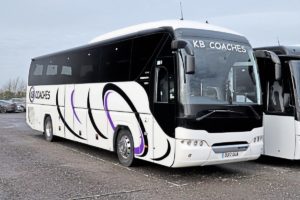
Currently the newest of a trio of Neoplan Tourliners is this 49-seater delivered in 2017. A tri-axle 57 seater is on order.
“We do nothing for local authorities, no direct school contracts, because they never want to pay enough money,” said Andy. “They keep on at me to do work because they want the quality and keep getting let down, but they are not prepared to pay. You get what you pay for.”
Utilisation of the fleet is extremely important and, thus far, keeping it busy on a balance of work has been profitably achieved. This does not mean that there have not been setbacks. Last September seven college contracts were lost because Stagecoach took them but the company has taken this in its stride and the ongoing investment programme has not been affected. A glance at the forward bookings book, which has day contracts in black, ‘swimmers’ in blue and both private schools and private hire in red, shows that it is busy throughout the year with many days already sold out.
“The MoT rate is 100% and the OCR ratings are both G3, scores that are always visible on the company website.”
At one time Andy thought the location, on top of a rural hill, was not that good because it was away from the towns, but as the catchment area he covers grows he has come to think it is second to none because of its proximity to Junction 13 of the M5 motorway, literally a couple of minutes away. “Nobody ever visits now because it is all done on the internet,” he said. “Being close to the motorway does mean you end up being people’s first call if someone breaks down on the M5 and we are quite often able to help. We try and do for others what we hope they would do for us,” he said.
Vehicles
It is Andy’s philosophy that the fleet should be as young as possible. His ambition is to get everything below three years old but with the gradual expansion that has been taking place there are limits on what can be achieved.
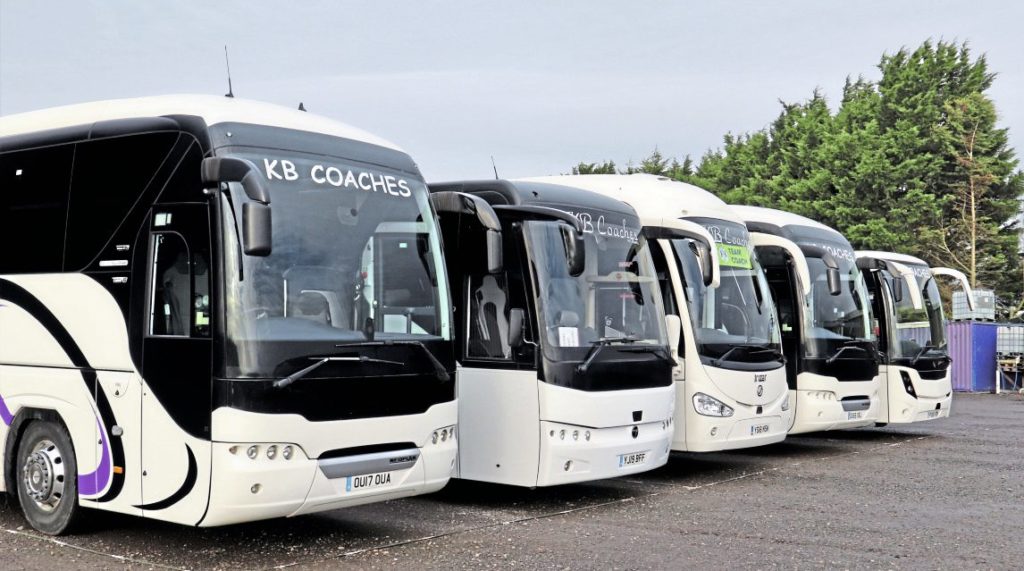
Price is the key determinant in Andy Francis’s vehicle purchases though he favours MAN and Paccar (DAF) engines. This line up in the yard shows examples of all of the key full sized body/chassis/integral combinations in the current fleet.
Nonetheless, if we ignore the anomaly of one spare Volvo B10M Alizee T8 70-seater from the 1990s, the current fleet strength of 18 vehicles is all Euro VI and the oldest vehicle has a 65 registration. By March, the fleet will have grown to 20 and the oldest coach will have a ‘16-plate. There aren’t many rural independents that can boast that sort of age profile.
“Most of it is good money management. I haggle a lot.” Andy Francis
Illustrating the rate at which new vehicles have been acquired (and replaced) is the fact that at least 20 coaches have been bought new since 2014 with more on order. In that year it was two Yutong TC12s (which Andy quite liked) and a 19-seat EVM Sprinter, in 2015 the first 70-seat MobiPeople Explorer-bodied MAN RR8 arrived after Andy saw one at the NEC show the previous year. “If you’ve got one 70-seater you have to have two,” said Andy, who bought another in the September of the same year. 2016 saw the company’s first tri-axle arrive, a 13.8m Neoplan Tourliner, followed by another two-axle 49-seater, a Yutong TC9 and the first PSVAR coach, a MAN TGL MobiPeople Midi Explorer.
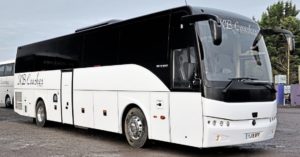
2019 saw the first new Temsas join the fleet. As well as this HD12 53-seater a 34-seat Temsa HD9 was acquired, seeing the last of a trio of Yutongs depart.
Satisfaction with the first two Tourliners and the fact that the price was right resulted in the purchase of another the following March. In the same month, a 74-seat RR8 Explorer was bought and the two existing 70-seaters were up-seated to 73. At the 2017 show, the BASE stand featured the first 12.2m MAN RR8 MobiPeople with 57 seats and a toilet, in KB’s colours and another was delivered in 2018. Also new in 2018 were two Irizar i6 coaches, one being the tri-axle team coach that Andy drives, and the other Michelle’s two-axle example.
Both purchased in 2018, the smallest coaches are a pair of EVM conversions of Mercedes-Benz Sprinter 516Ds, one a 22-seater and the other a 19-seater with tables. Pound for pound, Andy thinks the smaller minis are probably better earners than the full-sized coaches because they are a third of the price, use a third of the fuel, but earn probably 60% to 80% of the hire charge.
Last year the purchases were another 57-seat RR8 Explorer, a similar 74-seater which replaced the first one purchased, and the company’s first Temsas; an HD 12 53-seater and an MD9 midicoach. Passengers and drivers are very pleased with these latest additions.
Already on order for delivery in March are another 74-seat MobiPeople RR8 and a TGL Midi Explorer to PSVAR specification and a 57-seat Neoplan Tourliner that is not PSVAR compliant.
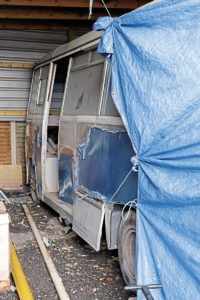
Hiding in a corner of the yard in a shed built especially for it is a 1965 Bedford VAS Duple Vista 29-seat coach that is a long term restoration project.
“We don’t get any problems with MAN support, though we don’t get many problems with the vehicles. MAN at Bristol are very good,” said Andy. On the Irizars any problems encountered have always been sorted. “The man with the van scheme works,” he observed. “BASE are the same, they’re brilliant and back up from Temsa seems to be fine at the present time.” Across the fleet there is very little downtime because everything is so new.
Very much the odd man out in the fleet is a P-prefix registered Van Hool Alizee-bodied Volvo B10M that serves as a spare 70-seater should one of the high-capacity coaches have an issue. They are all very reliable, so it sees very little action.
Another distinct contrast to the modernity of the front line fleet is a 1965 Bedford VAS with Duple Bella Vista that Andy bought a few years ago as a little restoration project and has turned out to be rather a big restoration project. It was in a pretty dire state and a huge amount of reframing, paneling and other major work has already been done, but there remains much to do. Andy said: “We use it for garage in-fill when we are quiet and are probably 60% there. We plan to get a Class VI MOT and will use it in the fleet, though we are struggling to get PSVAR compliance with it,” he joked.
I was intrigued to know how, when so many operators struggle to meet the investment demands of fleet renewal, KB Coaches has achieved the enviable position it now enjoys. Shedding some light on how he affords it all, Andy said: “Most of it is good money management. If I buy, I buy at a good price. I’ve got to buy on price; I can’t afford £300,000 motors. I haggle a lot and I start negotiating a long time in advance. We look after ours so we get a good price on resale. I think it makes a big difference making sure your books are always up to date. It gives finance companies the confidence to give you decent rates.”
Andy always looks very closely at his tax and any allowances that might be available, though he points out that you have to be making a profit to be able to take advantage of them.
He continued: “We do have to finance vehicles, but not cars, plant and buildings, and we always pay a healthy deposit so that every vehicle has equity in it. The other side of it is that we haven’t got fancy cars and we don’t do expensive holidays. It helps that we have no shareholders to consider and no hangers on sponging off us.”
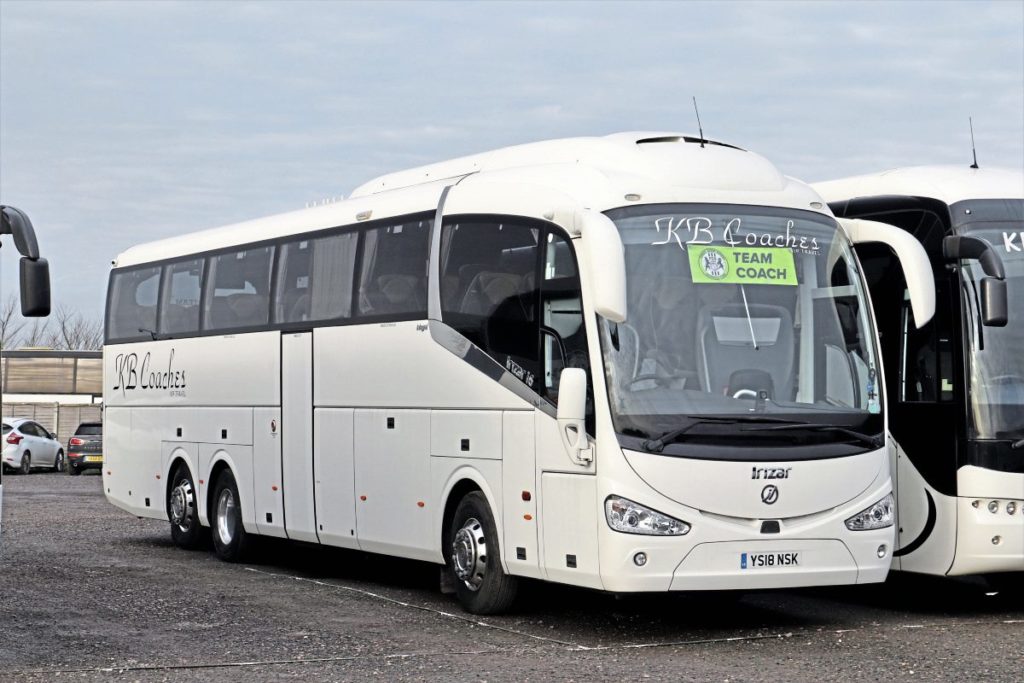
A one-driver, one coach policy is operated and this Irizar i6 tri-axle is Andy’s coach. It was converted in-house to full executive specification with a large central servery, tables and video monitors for football team work.
To be strictly accurate, Andy did have quite a flash Mercedes-Benz, but he didn’t use it much and it didn’t cost a lot. The two vehicles the couple now use were both bought after accident damage and repaired by the company, as was the operational support vehicle. “If we can buy something £10,000 cheaper, spend £2,000 on it and end up with the same thing, we do,” he said.
Andy believes it is important to continually work on the quality of your turnover, not just the quantity, because it is crucial to keep the cash flowing. He monitors the performance of the company closely, including the conversion rate of enquiries. He was very surprised to learn from an exercise over the first ten months of 2019 that the conversion rate of bookings to quotes was 99.8% (some quotations yield multiple bookings). He had expected it to be more like 80%.
Meeting PSVAR
It is difficult to have a conversation with an independent operator at present without the subject of PSVAR being raised. Andy is as relaxed about the issue as he is about other problems facing the industry.
He explained that the company already has one wheelchair-accessible vehicle and two more MobiPeople Explorer 74-seaters are to be converted in-house, using kits supplied by BASE. In addition, two of the three deliveries scheduled for delivery in March will also be PSVAR compliant, giving a total PSVAR compliant fleet of five coaches.
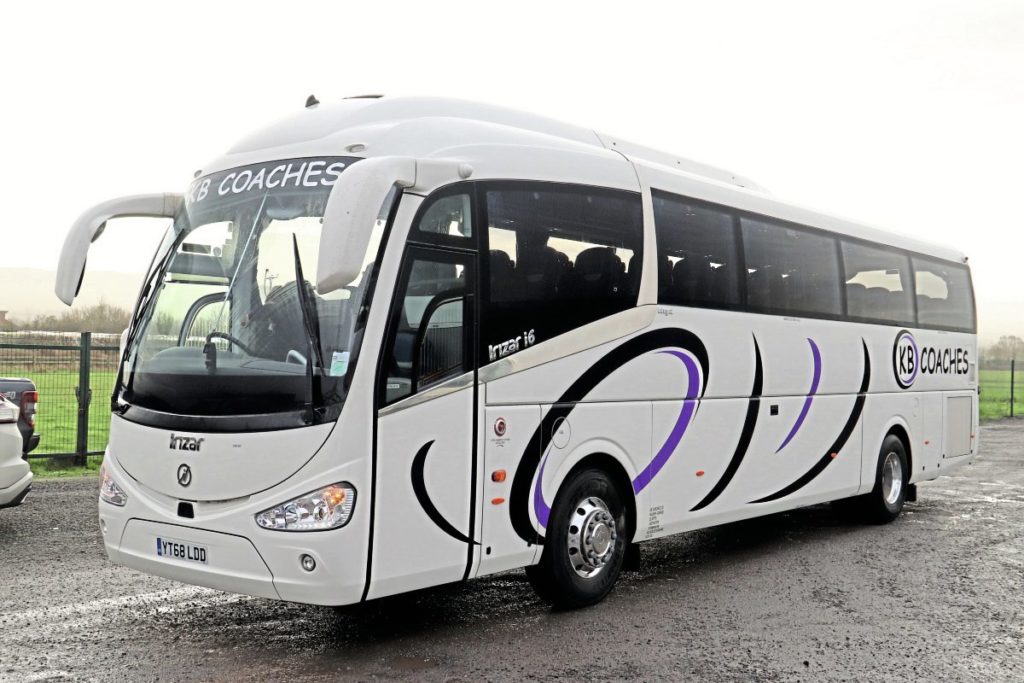
The second of the two 49-seat Irizar i6 coaches owned is this two-axle example which Andy’s wife Michelle drives.
Andy is confident that this will be sufficient to meet the company’s needs for the foreseeable future because he does not do a lot of relevant work for schools. He does not need them for rail replacement work either because KB Coaches no longer does any: “We don’t need to,” said Andy. He did have to cancel two registered services because he could no longer legally operate them, prompting the parents who organised them to involve a local radio station. When contacted by their journalists, he declined to comment. Andy added: “We have now rearranged how we do it in order to comply and it will make it easier because we now know the exact numbers and there are no walk-ons.”
This relaxed attitude does not mean that there is not a cost to the new interpretation of PSVAR that is now being pursued. He commented, “It is costing more money because the vehicles are costing more, and, if I’m honest, the rates haven’t gone up. Hopefully, the resale values of the PSVAR standard vehicles will be higher.”
Staff
There is no doubt that Andy expects a lot of his team and he insists they act in a manner that makes the passengers feel welcome. The company employs 15 full time drivers, including Andy and his wife Michelle.
“It makes a difference having full-time drivers: they all know what they are doing and take care. They all have their own vehicle and are responsible for it. If they do have to go on another they are back on their own within a day,” said Andy, who believes it works well for staff retention. He stresses that he and Michelle take their fair share of driving responsibility, saying: “If my coach has to go out tomorrow, I will be driving it, even if I have drivers in the yard. It works well; because I do the football work, drivers know that every other Saturday I will be back late.”
Also driving is the couple’s son, Dean, who is 24. He has been with the business for two and a half years and has the nickname “Princess” because of a childhood fussiness over food. “He’s a good lad and he does work hard,” said Andy.
When it comes to cleanliness Andy is fanatical. In addition to the six-weekly inspections there is an intermediate check, not only of key mechanicals but of the cleanliness of the coach. Every coach has a vacuum cleaner fitted and the company pays for all the cleaning materials ‘so there’s no excuse for one ever to be dirty.’ The policy of one man, one coach does help in this respect, Andy recognises. “I’d hate it if my guys had to chop and change vehicles. Those who keep them the cleanest get the newest coaches,” he said. “Each coach is a big investment for me, so I want to be sure someone is looking after it and loving it.”
To make sure everyone keeps their Driver CPCs up to date, a training day is held once a year, either between Christmas and New Year or during October half term. It is held in the skittle alley of a local pub and the company pays for the trainer and lunch, though the drivers are not paid to attend because it is their responsibility to keep up their licences. Anyone who does not attend has to make up their training quota somewhere else at their own expense.
As I arrived, a trainee driver was reversing a coach around the yard ahead of his forthcoming test. Six years ago, Andy started training drivers in-house and putting them through their tests: “I think we have trained five now and all are still here,” he said. The average age of the team is relatively low – somewhere between 40 and 45. One full timer is 19 and another is 65, but apart from a couple of part timers who are 65 and 72, nobody else is over 60.
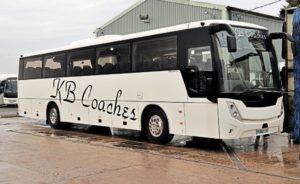
The newest of the MAN MobiPeople Explorers is this 74-seater in the latest livery. Andy likes to change the scheme from time to time to keep things fresh.
Until five years ago, Andy did all of the mechanical work himself in addition to the quotes, schedules and accounts. Though he still plays a part, the garage is now the realm of Ricky and Alex. The MoT rate is 100% and the OCR ratings are both G3, scores that are always visible on the company website.
“You have to go for high standards and high quality. I don’t want my vehicles with any faults and I encourage my staff to report any defect, no matter how trivial,” said Andy. He uses the Trutac digital defect reporting system, also employing Trutac’s tacho analysis and driving licence check services. He is particularly impressed with the digital defect reporting system which enables pictures to be taken of any damage and monitors how long checks take to ensure thoroughness.
“My biggest gripe with the industry is that I don’t think VOSA are checking operators, vehicles and depots enough. We all know there are good and bad operators. VOSA should be doing more to raise the standard,” Andy said.
The workshops used to undertake work for other companies but Andy found people didn’t want to pay what it cost, ‘so we don’t do much now.” The approach is the same as in other aspects of the business, “If there’s no money in it, we’re not interested.”
In the office are Tash, Chey (who also drives) and Kathy. Tash is Dean’s girlfriend.
Employment law is looked after by Peninsular and £25,000 has recently been spent on fitting the whole fleet with CCTV, helping to deal with any controversial insurance claims.
Growth
If acquiring the original premises was an important day for the company, another opportunity taken in 2015 will likely prove just as crucial to the company in the long run. A local farmer offered Andy two acres of land to the rear of the existing depot, including an adjacent plot of a similar size to the rear of his house, which is next door to the garage. One of the reasons he bought much more land than he needed at the time was that he has heard so many operators say; ‘If only I had bought that land next door for £500 thirty years ago.’
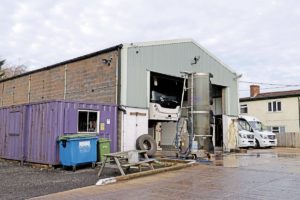
The well equipped workshops. An earlier garage on the site blew down in stormy weather in the mid-1990s.
In October 2015, planning permission was obtained for an extended site using half of the additional land. It permits an additional 20 vehicles on top of 14 vehicles in the existing site. The number of licences authorised was increased to 20 but it means that the fleet could grow significantly if necessary. All the work digging out and preparing the site was done in house (with a secondhand JCB nicknamed Scoop) and it is laid out so that it is clear where coaches should be parked, with ropes set into the surface.
Although the premises are well equipped, there is no fuel storage on site, with fuel cards used instead. Andy commented: “There is not a lot of difference in price between bunkering and having fuel on site these days and there are fewer risks.” When the environmental aspects are taken into account as well, he believes it is just not worth having fuel on site.
The job Andy hates the most is when the clocks change and he has to change the time on 18 tachographs. It is always a Sunday morning so it’s him who has to do it. Juggling driver’s hours is always a challenge. In an ideal world: “I’d rather have nothing out on a Sunday and everything parked up, because it would be easy then,” he said.
Into the future
Plans for the future revolve around getting and keeping the whole fleet under three years old, otherwise the intention is to continue things as they are. Andy says he does not want to go over 20 vehicles because he thinks it is “a comfortable size”. Andy claims that another advantage is that the whole staff can go the local pub in one of the minibuses; there isn’t room in the car park of The Badger for a full-sized coach. “I speak to a lot of operators with 60 to 70 vehicles and they wish they only had 20,” said Andy.
Last word
I’m used to a fair proportion of operators expressing concern about the future of the industry and their future within it, but when I asked Andy whether anything worried him, he said: “Nothing really bothers me. We’ve got good staff retention, we have constant enquiries about job opportunities, we have good staff, we have reliable vehicles, we have a good volume of work, we even have to turn work down on some days, there’s no concern over premises because we own them, cash flow is good – which is a key thing, we are fully Euro VI compliant, by March we will be PSVAR compliant for our needs… and I’ve just found a fiver I didn’t know I had in my phone case. I’ve no real worries…”
